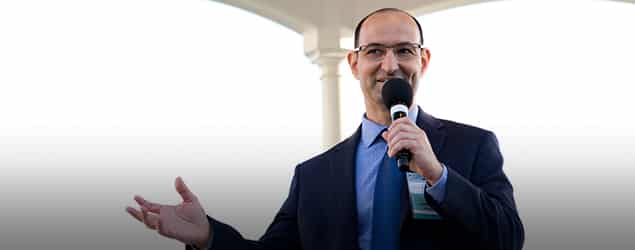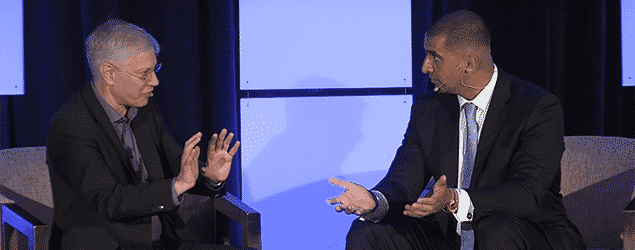Junior Fellows Program — An Interview with Elan Journo

Are you passionate about Ayn Rand’s ideas? Are you seriously considering a career as an intellectual activist? In this interview Elan Journo discusses ARI’s Junior Fellows Program, the benefits of the program for the junior fellow and ARI, the ideal candidate and more.
What is the Junior Fellows Program and why is it important to ARI?
Elan Journo: The Junior Fellows Program (JFP) is a unique opportunity for people interested in Ayn Rand’s ideas and an intellectual career. Essentially, it’s a career training path the Institute developed a few years ago as part of our ambitious, long-term goal to cultivate many new Objectivist intellectuals.
The program is part of a portfolio of efforts to find, train and nurture future intellectuals necessary to advance Objectivism in the culture. This is a goal ARI has been pursuing for decades, primarily through the Objectivist Academic Center — a distance-learning program focused on Objectivism and on developing skills needed for a successful intellectual career.
Whereas the classes at the Objectivist Academic Center are held primarily over the Internet using video conferencing, the JFP is an in-person, on-the job immersive experience. The junior fellows join the ARI staff for up to a year, at our headquarters in Irvine, California, or our satellite office in Virginia. They gain real-world work experience and skills, and they take part in intensive training workshops.
How does the Junior Fellows Program differ from other typical work-study programs?
EJ: Some work-study or internship positions are undemanding, go-make-photocopies sorts of roles. By contrast, the Junior Fellows Program involves real jobs, and the expectations are high. The junior fellows take on projects that advance ARI’s mission. Working closely with ARI’s senior intellectuals, they support large-scale editorial projects, through research, writing, editing and fact-checking. We expect them to roll up their sleeves and engage in truly substantive work. Along with that, they take on at least one large-scale individual research project, which they write up as a white paper. At every turn they have opportunities to hone their skills, deepen their knowledge and learn from critical feedback.
What can people expect to gain from the program?
EJ: The program is a win-win for participants and ARI. Participants get a chance to find out what it’s like to do intellectual work and determine if this is the type of career they are passionate about. They get a clear picture of what an intellectual career looks like, day-to-day.
From ARI’s standpoint, we want to find future intellectuals and equip them for their careers to advance Objectivism in the culture. The JFP helps accelerate them on this path.
What happens after the program concludes?
EJ: There are exciting career opportunities for graduates. Two of ARI’s current research associates, Amanda Maxham and Carl Svanberg, are past JFP participants.
Even if graduates go on to another think tank, become writers or journalists, they have gained skills to be productive and more successful in their careers.
What does the ideal candidate look like?
EJ: ARI is looking for people who can demonstrate real knowledge of Rand’s ideas, people who are ambitious and open to learning. I want to concretize that last point. By the nature of the program, the junior fellows get critical feedback on their work and in the training workshops. So they need what you could call a “growth mindset.” Some people have a tough time with critical comments on their work; they can get defensive, and as a result they miss opportunities to grow. A growth orientation, by contrast, means being open, non-defensive about what you do and don’t understand, and seeking to learn from failure, errors, unclarity. We’re looking for people who will think about and distill the feedback they get, and use it to grow, improve and clarify their thinking. In my view, that kind of outlook is essential to intellectual growth.
To mention some of the basics we’re looking for: the program is open to people from all fields — law, humanities, social sciences, hard sciences, etc. — but all candidates should possess a deep desire to learn and apply Rand’s ideas to thinking and writing.
And it’s important that applicants have some academic training. An undergraduate degree is necessary. It’s also a huge advantage to have completed the first year of ARI’s Objectivist Academic Center. ARI’s website, AynRand.org, lists the details of what we’re looking for beyond that.
How do people apply to be considered?
EJ: We ask applicants to help us create a picture of their abilities. We want to see examples of each applicant’s critical thinking and writing skills. The full details are on our site, which you should read carefully, but I’ll mention here that if you want to apply, set aside time to complete the two brief writing assignments. We ask you to write two short blog posts that respond to readings we point to on the web. We also ask you to submit something you’ve already written as an example of your best writing.
How can people determine if this is the right opportunity for them?
EJ: Whatever career you might be drawn to, it’s a great idea to get some first-hand, concrete experience of what’s entailed, day-to-day. The more you know, the better placed you are to figure out your goals. Suppose you’re interested in becoming a doctor: obviously, that requires going to med school, but beyond that, you’d want to get a sense of what it’s like to do that job, to keep up with the medical literature, open a medical practice and so on. So you might talk to doctors you know personally or volunteer at a hospital to get some experience. The same, in pattern, is true if you’re interested in an intellectual career. But what might you do to learn about that kind of work?
The Junior Fellows Program can help people conceptualize what intellectual work entails and whether it’s for them. If you find yourself seriously considering an intellectual career and you want to explore that path, the JFP is the perfect opportunity.
Other resources:
- Carl Svanberg’s JFP testimonial
- Amanda Maxham’s JFP testimonial
- Apply by June 15
For more news on ARI’s fight for a rational culture, subscribe to Impact Weekly.



